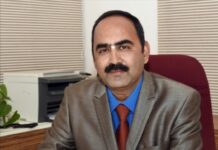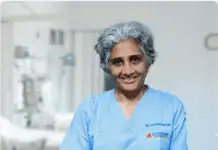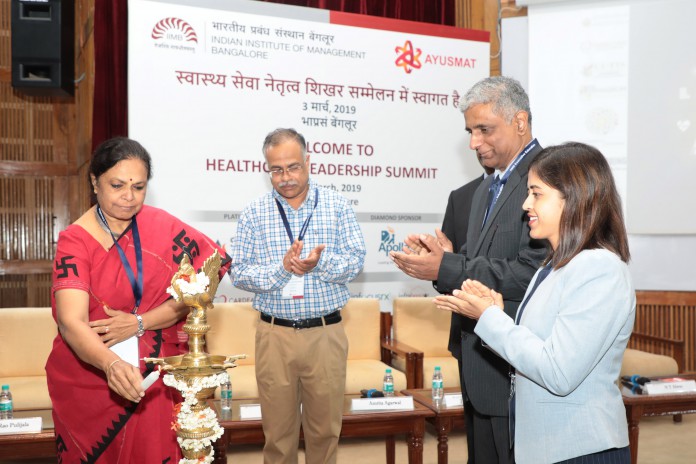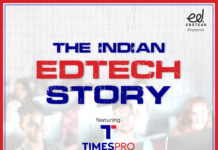04 March, 2019, Bengaluru: “Healthcare in India needs increased funding and policy intervention. In India, people tend to take healthcare issues to politicians and bureaucrats, while doctors are kept out of the management aspect. Healthcare can be transformative to India’s growth. Hence summits like ‘Ayusmat’ at IIMB are vital to throw light on fundamental issues of healthcare like financing, quality, insurance, price capping, efficiency, accessibility,” said Chief Guest K. Sujatha Rao, author and former Union Secretary of the Ministry of Health and Family Welfare, Government of India, while talking about ‘Indian Healthcare Scenario – Actual vs Ideal – Roadmap to Bridge the Gap’ at IIM Bangalore, on Sunday (March 03).
Ms. Rao was speaking at Ayusmat 2019, a healthcare leadership summit organized by the participants of the General Management Programme for Healthcare Executives (GMHE) at IIM Bangalore. Ayusmat is a platform for academicians, researchers, students, practitioners, policy makers, CXOs of healthcare organizations, health-tech consultants, venture capitalists, start-ups and thought leaders in the field of healthcare. The theme for this year’s ‘Ayusmat’ was Cost, Quality and Accessibility, the three aspects that pose the greatest challenge for efficient healthcare service delivery.

Important Announcement – EasyShiksha has now started Online Internship Program “Ab India Sikhega Ghar Se”

Ms Rao went on to assert that overall public spending on healthcare in India was very low, and listed a few remedial measures. “Due to low spending, the challenge becomes how to prioritize the utilization of funds. Ideally, we must prevent people from getting ill, but if they do fall sick, they should be have access to quality healthcare. Another problem in the Indian system is that there is little data on clinical outcomes. Patients should be the main drivers in healthcare. Efficiency is another aspect to focus on. Financial structures of Indian hospitals, whether private or public, need to be based on appropriate models.”
Different sectors interlacing with healthcare, namely Finance, Management and Leadership, Policy, Technology, Insurance, Pharmaceutical, and Start-ups, amongst others, play a significant role in designing service delivery systems that balance these dilemmas. The closer healthcare providers approach the ideal of high medical access and quality at the lowest possible cost with innovation, the better they are at delivering value-based care in their healthcare models. The deliberations of the conference aimed to address these issues in detail.
The event started with a talk on ‘Quality in Healthcare’ by Dr. T. S. Ravikumar, Director, SVIMS, Tirupati. He listed the problems plaguing the healthcare system in India: supply-demand mismatch of resource, knowledge gap, infrastructure, inadequate spend, lack of accountability in terms of quality, etc. “We need to create better care for the individual patient and the population at an affordable and sustainable cost. Quality is critical for the success of universal health care. A high cost does not necessarily signal good quality. Increasing GDP does not guarantee increased quality in healthcare, and improved processes do not guarantee desired outcomes. What matters in quality is the output, not the inputs. You need to measure, report and reward.”
Dr. Ravikumar spoke about the safety aspect in the country’s hospitals. “Patient safety is at the core of quality. There can be passive or active harm – reporting of errors is essential. Risk adjustments are required. Safe practices include multiple wedges of improvement for continuous optimal performance. We need retooling of healthcare providers. Quality is everyone’s responsibility and we never have to stop getting better. Overall, a patient-centred approach is crucial.”
This session was followed by a discussion on ‘Ayushman Bharath: Decoded for Management Executives’ by N.T. Abroo, IAS, Executive Director, Suvarna Arogya Suraksha Trust, Government of Karnataka. She explained how Karnataka is making quality and affordable healthcare accessible to everyone in the state. According to her, reducing health inequities is crucial because health is a fundamental human right. She spoke in detail about the Yeshasvini Scheme, Arogya Karnataka Scheme, etc. “The top 10 performing hospitals are government hospitals. We are on the road to success. We must merge of private and public sectors, and ensure systematic quality by offering schemes universally to the needy.”
Dr. Chitra Sarkar, Dean (Research) and Professor of Pathology, AIIMS Delhi, while discussing ‘Leadership in Healthcare – Does it Demand Uniqueness?’ focussed on the aspect of ‘Medical Leadership’, based on research conducted by AIIMS. “Leadership needs to align vision, culture and operations to deliver sustained value. A leader has to implement innovation and change,” she observed. She defined Medical Leadership as a physician’s ability to serve both as a leader and manager of diverse teams in pursuit of maximally effective patient care. “Transformational Leadership is more important than Transactional Leadership. The leaders should be able to think about the way things are and how they should be. Leadership requires talent with passion, attitude, and skills to seize new opportunities, understanding of external factors like IT, economics, finance, new insights on best practices, etc., being self-aware, being able to take calculated risks, and being ethical. You don’t have to have position to be a leader and you cannot make everyone happy”.
Dr. Sarkar lamented the fact that physicians in India tended to stay away from management and said organizational performance would be better if doctors lead organizations. “Doctors tend to move away from such functions due to job description, medical education system, intellectual elitism, expectation for hospitals to perform such duties, low career prospect, weak incentives, not being recognized as speciality, being under resourced, etc. But doctors should treat this as a challenge, take initiatives, because their focus only on clinical medicine has led to a gap in medicine. Leadership can be taught/learned, and can improve over time. There can be leadership development programs by management institutions and the medical fraternity. If you want to be a leader, you need to establish your credibility. If healthcare organizations, hospitals and industry are to remain at the forefront of service delivery, they require leaders capable of leading them. Emotional Intelligence can also play a vital role in providing better healthcare. All these competencies need to be integrated to increase organizational performance.”
The first half of the day also saw a panel discussion, titled: ‘Healthcare Financing in India – What and Who will be the Game Changer?’ moderated by Dr. Srinivasa Rao Pulijala, Chief Executive Officer, Apollo MedSkills. The panelists spoke about world-class hospitals on one hand, and people struggling for accessibility and affordability on the other, the start-up ecosystem addressing the challenges, funding, etc.
Dr. J Radhakrishnan, IAS, Principal Secretary, Health and Family Welfare, Government of Tamil Nadu, recommended sustained, preventive and promotive health as well as innovative partnerships.
Amrita Agarwal, Health System Design, Bill and Melinda Gates Foundation, discussed insufficient funding for the sector, sources of funding and said proper utilization is needed to get maximum value. She also spoke about other problems like lack of outcome measurement and a fragmented healthcare system.
Dr. Ramesh B, Managing Director, Endiya Partners, discussed how healthcare system is evolving in India and the role of start-ups. He said there is huge scope for innovation in the sector and that data is a crucial factor.
Dr. (Maj.) Snigdha Paddalwar, Head, NH Mahalaxmi, Mumbai, spoke about her experience in working for the army and explained how financing works in a public-private partnership (PPP) model. “We need to focus on reforming and redesigning healthcare at all levels. Preventive healthcare is very important. PPP if implemented after proper research can be a game changer.”
Top Software Engineering Courses
Dr. Manish Rai, Head of Operations, Manipal Hospitals, gave a private provider perspective and discussed ways to manage trust. He also spoke about healthcare in the Railway sector. He went on to suggest few measures that can help enhance the healthcare system in India. “Quality indicators are needed. Integration with the private sector would prove beneficial. A PPP model is recommended. We also need a regulatory framework and a framework to judge the efficacy of the private sector. We need to look at the healthcare system in entirety and try to achieve massive support from Government.”
All the panellists were united in their opinion that all stake holders in the healthcare system need to work in tandem and that there were more positives than negatives in the sector, today. “It is our India, and it is up to us to take it forward,” said Dr. Pulijala.
The second half of the day saw another panel discussion, titled: ‘Transitions Driven by Innovative Technology in Healthcare’ was moderated by Professor Shankar Venkatagiri, IIMB faculty from the Information Systems area and Director, GMHE. It featured Arnab Chattopadhayay, Associate Director, IBM, Dr. Jagdish Chaturvedi, Founder and CEO, HiiiH Innovations Pvt Ltd., Mohammad Ameel, Senior Consultant, NHSRC, Anil Kumar Jagirdar, Principal Consultant (Healthcare), PwC India, Kedar Medhi, Director, Philips HealthWorks, Nirod Kumar Singh Thokchom, Director MEASA, Frost & Sullivan. This was followed by a debate on ‘Will Price Capping in India Kill Quality and Investment in Healthcare?’ featuring Ganesh Sabat, CEO, Sahajanand Medical Technologies, Dr. Ravi Kannan, Director, Cachar Cancer Hospital and Research Centre, Assam, and moderated by Dr. Santosh Kumar, Senior Advisor in Healthcare Quality Assurance.
——————————————————————————————————————————————
Sign up / Register with EasyShiksha or Download the app and get free online education account. Get latest Jobs Notification & Current Affairs. You can access more than 50 free online courses, various computer and SSC Bank Railway test series and find your career options. You can Sign up with Facebook
Empower your team. Lead the industry
Get a subscription to a library of online courses and digital learning tools for your organization with EasyShiksha
Request NowALSO READ: OHPC-recruitment-technical-trainee-vacancy-apply-online
Get Course: Learn-Communication-Basics-Strategies






































































